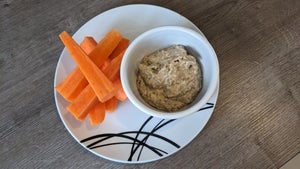The benefits of fermented foods is a hot topic of discussion for food bloggers and medical experts alike. Perhaps the newest group of superfoods: fermented foods are celebrated for their live bacteria content, which is thought to be the major reason for their many unique health benefits.
In the world of food and diet, trends come and go, and it can be difficult to separate the facts from the fiction. That’s why we’ve done our research, reading up on everything from kimchi to kombucha, so you can distinguish the fact-based from the fads when it comes to fermented foods.
What are fermented foods?
First things first: what are fermented foods?
To put it simply: fermented foods are foods that have gone through the fermentation process. In this fermentation process, the food is broken down into something chemically different from what it was before.[1] It’s the reason why many seemingly magical food transformations happen: making grapes turn into wine, and milk turn into yogurt. Many of us might not like to imagine a world where fermentation and its delicious by-products don’t exist.
To get a little more nitty gritty: in the fermentation process, bacteria and yeast are responsible for breaking down sugars present in a food.[2] Fermentation can happen naturally – when a fruit falls on the ground and ferments into alcohol, for example – or it can be done in a lab, a kitchen, or a distillery. Although fermented foods like kombucha and kefir may seem like the hot new thing, they are part of a longer legacy of fermenting foods for enhancing flavour and for preservation, which has been performed in many human cultures for centuries.[3]
The new, modern side to the fermented foods story is that we are learning more and more about their health benefits every day: benefits that can really make the fermentation process feel kind of magical.
Fermented foods and the gut
The key to why fermented foods are so beneficial for us ties in with gut health. The gut – also known as the digestive system – helps our body break down the food and drink we consume into nutrients that can be used for growth, immunity, energy, and repair. Because the gut has such a significant role in the body, it’s no wonder that nourishing your gut health is vital if you want to take care of your overall health.
But what do fermented foods have to do with the gut? The answer starts with bacteria.
A key part of the fermentation process is the breaking down of sugars by bacteria and yeast.[4] The human gut is home to trillions of bacteria[5] – which may sound alarming at first, but it isn’t! In fact, these bacteria are natural, and many of them help us to digest and obtain nutrients from our food.[6] These beneficial bacteria are called probiotics. The research shows that the presence of probiotics in the gut comes with a number of significant health benefits, from helping to protect us against pathogens,[7] to providing relief from the symptoms of irritable bowel syndrome (IBS).[8]
Studies have shown that fermented foods tend to contain higher numbers of live bacteria – and probiotics – which means that eating more fermented foods can be beneficial for our gut health.[9] Just as more and more people are upping their intake of fermented foods for their probiotic content – many people are also choosing to take probiotics in supplement form. Alflorex® and Zenflore® are both examples of probiotic supplements. Each is specially formulated to contain different bacterial strains that are targeted to supporting different aspects of your health: from immunity, to mental wellness.
The benefits of kimchi for gut health
Kimchi – a Korean dish made by fermenting cabbage with chilli, garlic, and other spices – is broken down with lactic acid bacteria (LAB), as well as other bacterial species. During the fermentation process, the presence of these bacteria along with other key ingredients helps to eradicate any pathogenic bacteria from the kimchi, while also increasing its nutritional value.[10]
Eating kimchi regularly has also been shown to significantly alter the composition of your gut microbiota: in an experiment that lasted several weeks, a group of people who started eating kimchi regularly had a higher number of probiotic species present after they increased their intake.[11]
How fermented foods may prevent a leaky gut
If you haven’t heard of a leaky gut – chances are you can infer from its name that it isn’t such a good thing to have. The different strains of bacteria that live in a healthy gut normally exist in balance; but in the case of a leaky gut, this balance of gut bacteria is thrown out. This condition of imbalance, referred to as dysbiosis, can cause the walls of the intestines to weaken and leak their contents where they shouldn’t go: into the bloodstream.[12]
Leaky gut has been associated with numerous health problems, including asthma, eczema, and even schizophrenia.[13] But studies have shown that eating fermented foods can help to restore balance to the gut microbiome, ultimately preventing the intestines from leaking.[14]
When to eat fermented foods
The health benefits of fermented foods are many, and there’s little reason not to eat them as often as you can as part of an overall balanced diet. Their positive effects on gut health can have long-term implications: eating a diet high in fermented foods may lower the risk of developing type two diabetes and cardiovascular diseases, according to one study.[15]
But in particular, if you’re looking to restore your gut health after taking a course of antibiotics, it may be a good time to eat more fermented foods – since they’re packed full of probiotics. Many doctors will advise patients to eat more probiotic foods such as yogurt and kefir during and after taking antibiotics.[16]
Which fermented foods contain the most probiotics?
Many fermented foods are considered probiotic foods because of their high bacterial content: miso, sauerkraut, and kombucha are some examples of these.
Yogurt and kefir are also very high in probiotics – but different brands can vary in terms of how many bacterial cultures they contain. Yogurt and kefir with more bacterial cultures will have more gut-supporting probiotics – so be sure to check the label when you’re shopping.
Using fermented foods in your recipes
From kimchi to sauerkraut, yogurt to kombucha, and miso to pickles, the world of fermented foods offers an exciting array of flavours and textures that can tickle any tastebuds.
If tangy foods are what you fancy – kefir and yogurt can be enjoyed as they are, or they can be added to recipes for salad dressings, soups, and sauces to bring an extra touch of sourness.
Fermented vegetables can also add excitement to sandwiches and salads – and they can come in a variety of forms, from kimchi (cabbage fermented with spices) to sauerkraut (kimchi’s Germanic cousin).
Playing with the sweetness of fermented desserts, the tartness of yogurt, and the saltiness of pickles, and even the bitter flavours of some fermented vegetables can add excitement, nuance, and decadence to your recipes. But never neglect umami – the lesser-known flavour we encounter in rich soups and sauces. Miso is a fantastic ingredient for adding umami flavour to any dish, and its versatility means it can be used in vegetable glazes to soup bases, adding richness in flavour as well as plenty of health benefits to the recipe you’re preparing.
Fermenting vegetables at home
With the popularity of fermented foods on the rise, the range of fermented foods available in health food stores and mainstream supermarkets is expanding. But that shouldn’t stop you from fermenting your own foods at home – in fact, it is often more cost-effective to do so, and the process can be a lot of fun, too!
Fermenting vegetables at home is easier than you might think. There are a number of recipes available online for this – as well as for making your own fermented sweets, yogurt, and even kombucha. For fermenting vegetables, all you really need is salt to make a brine, and a clean jar to do the food fermentation in.
Fermenting vegetables at home means you’re free to tailor your recipe to your tastes: adding garlic and spices is a great way to add some zing. Plus, if you make fermenting your ‘thing’ – you’ll be reaping plenty of health benefits.
References:
[1] https://www.heartfoundation.org.nz/about-us/news/blogs/fermented-foods-the-latest-trend
[2] https://www.healthline.com/nutrition/8-fermented-foods#:~:text=The%20term%20%E2%80%9Cfermented%20foods%E2%80%9D%20refers,yeast%20and%20bacteria%20(%209%20).
[3] https://www.heartfoundation.org.nz/about-us/news/blogs/fermented-foods-the-latest-trend
[4] https://www.healthline.com/nutrition/8-fermented-foods#:~:text=The%20term%20%E2%80%9Cfermented%20foods%E2%80%9D%20refers,yeast%20and%20bacteria%20(%209%20).
[5] https://www.healthline.com/nutrition/gut-microbiome-and-health
[6] https://www.hsph.harvard.edu/nutritionsource/microbiome/
[7] https://www.ncbi.nlm.nih.gov/pmc/articles/PMC4006993/#:~:text=Several%20beneficial%20effects%20of%20probiotics,adherence%20to%20the%20intestinal%20epithelium.
[8] https://www.medicalnewstoday.com/articles/323490#benefits-and-side-effects-of-probiotics
[9] https://pubmed.ncbi.nlm.nih.gov/30197628/
[10] https://pubmed.ncbi.nlm.nih.gov/27733844/
[11] http://www.koreascience.or.kr/article/JAKO199603042044026.page
[12] https://www.health.harvard.edu/staying-healthy/fermented-foods-can-add-depth-to-your-diet
[13] https://www.health.harvard.edu/staying-healthy/fermented-foods-can-add-depth-to-your-diet
[14] https://www.health.harvard.edu/staying-healthy/fermented-foods-can-add-depth-to-your-diet
[15] https://pubmed.ncbi.nlm.nih.gov/30197628/
[16] https://www.health.harvard.edu/digestive-health/benefits-of-probiotic-foods-using-good-bacteria-for-better-health#excerpt







